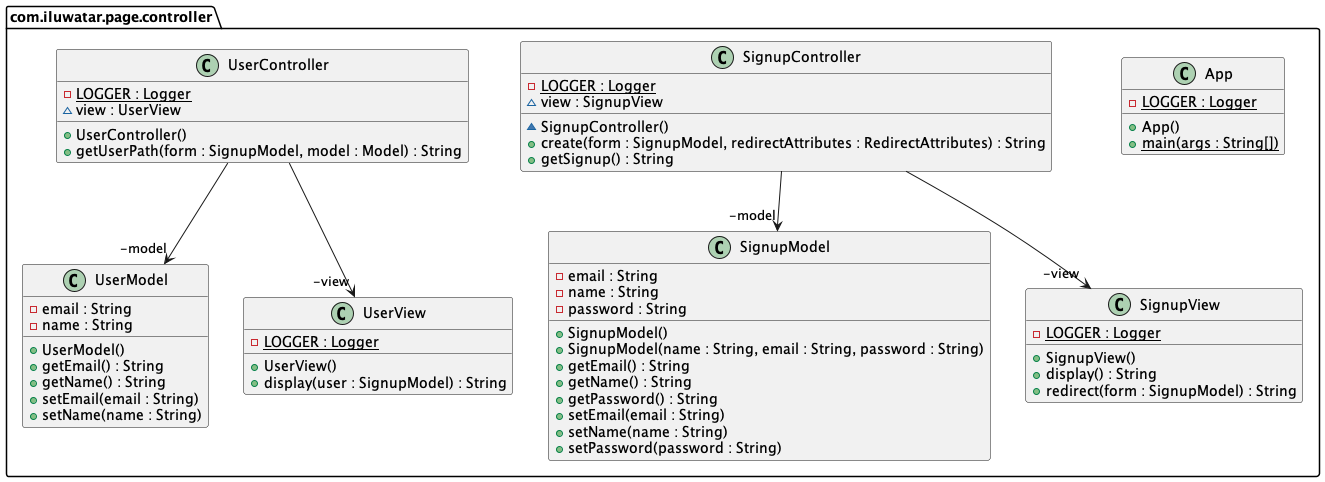Page Controller
Name / classification
Page Controller
Intent
It is an approach of one page leading to one logical file that handles actions or requests on a website.
Explanation
Real-world example
In a shopping website, there is a signup page to register a user profile.
After finishing to signup, the signup page will be redirected to a user page to show the user's registered information.
In plain words
Page controller manages HTTP requests and data in a specific page using MVC idea.
The idea is that one page contains one Controller that handles Model and View.
Programmatic Example
Here's Signup controller when a user signup their information for a website.
@Slf4j
@Controller
@Component
public class SignupController {
SignupView view = new SignupView();
/**
* Signup Controller can handle http request and decide which model and view use.
*/
SignupController() {
}
/**
* Handle http GET request.
*/
@GetMapping("/signup")
public String getSignup() {
return view.display();
}
/**
* Handle http POST request and access model and view.
*/
@PostMapping("/signup")
public String create(SignupModel form, RedirectAttributes redirectAttributes) {
LOGGER.info(form.getName());
LOGGER.info(form.getEmail());
redirectAttributes.addAttribute("name", form.getName());
redirectAttributes.addAttribute("email", form.getEmail());
redirectAttributes.addFlashAttribute("userInfo", form);
return view.redirect(form);
}
}
Here's Signup model and view that are handled by Signup controller.
@Component
@Getter
@Setter
public class SignupModel {
private String name;
private String email;
private String password;
public SignupModel() {
}
}
@Slf4j
public class SignupView {
public SignupView() {
}
public String display() {
LOGGER.info("display signup front page");
return "/signup";
}
/**
* redirect to user page.
*/
public String redirect(SignupModel form) {
LOGGER.info("Redirect to user page with " + "name " + form.getName() + " email " + form.getEmail());
return "redirect:/user";
}
}
Here's User Controller to handle Get request in a user page.
@Slf4j
@Controller
public class UserController {
UserView view = new UserView();
public UserController() {}
/**
* Handle http GET request and access view and model.
*/
@GetMapping("/user")
public String getUserPath(SignupModel form, Model model) {
model.addAttribute("name", form.getName());
model.addAttribute("email", form.getEmail());
return view.display(form);
}
}
Here's User Model and View that are handled by User controller.
@Getter
@Setter
public class UserModel {
private String name;
private String email;
public UserModel() {}
}
@Slf4j
public class UserView {
/**
* displaying command to generate html.
* @param user model content.
*/
public String display(SignupModel user) {
LOGGER.info("display user html" + " name " + user.getName() + " email " + user.getEmail());
return "/user";
}
}
Class diagram

Applicability
Use the Page Controller pattern when
- you implement a site where most controller logic is simple
- you implement a site where particular actions are handled with a particular server page